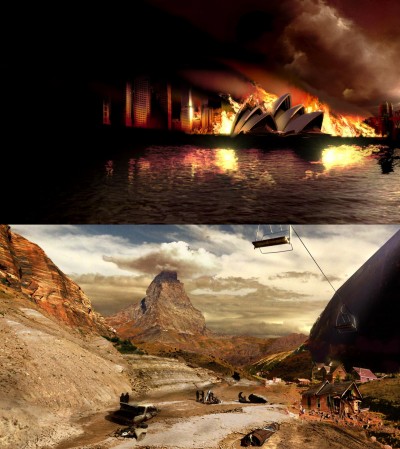Our changing climate is likely to produce some nasty shocks unless we can change some deeply ingrained habits, as a new film dramatically illustrates. [18 August 2009 | Peter Boyer]
Last week I reflected that we’ll do well to ask ourselves “What if we’re wrong about climate change?” If you saw this as a sign that I think the science around climate change is uncertain, you’d be absolutely right, but you’d be wrong to conclude that I’ve changed my position.

Sydney ablaze (above) and a snowless European Alps: future climate visions from the UK film, “The Age of Stupid”
This question of certainty looms large in the public debate about climate. Where’s the proof? say those who would have it that only nature changes climate. This is a straw man argument — a false position set up to be knocked down — which exploits people’s wish for definite answers.
We should never shut any gates. Science, which thrives on exploring alternative possibilities, is never certain. “Sceptical” websites like the Australian Climate Science Coalition are worth the odd visit because you never know when something interesting might turn up.
But wherever you look, definite answers seem to be the go. The ACSC website has a quiz requiring “true” or “false” responses — slanted, as you might expect, toward the view that nature, not human activity, is the main influence on climate.
We won’t make progress in the climate debate until we’ve shaken this right-wrong mindset. Scientists will continue to gather and analyse the evidence and the rest of us shouldn’t shy away from questioning their findings, but do-it-yourself investigations are a waste of valuable energy.
While there will always be dissenting voices, as of now the weight of scientific opinion leans massively toward the view that human fossil fuel burning is the main current influence on global climate patterns. That being so, we need to weigh up what this means for us.
“What’s the worst that could happen?” is the question posed by Greg Craven, the Oregon schoolteacher-author who got a wrap from me last week.
What if all those scientists are wrong and high carbon levels don’t bring warming or acid oceans? If we act, the resulting changes may be beneficial. But we may strike economic trouble (especially if you factor in an inevitable decline in oil production, or peak oil) with global economic depression an unlikely but conceivable result. That would seem to be the worst that could happen.
On the other hand, what if we fail to act effectively and the current scientific view turns out to be right? We can be sure that with carbon emissions unchecked, nothing will prevent global warming and ocean acidification from gathering pace. We’ll still have peak oil. And so long as atmospheric carbon levels continue to rise, there’s no upper limit to the potential impact.
If we need to get a stronger handle on what this apocalyptic scenario might look like, we should check out a film that has its Tasmanian premiere in Hobart this week.
In his 2007 book Six Degrees, science writer Mark Lynas described future climate scenarios based entirely on peer-reviewed scientific papers. The Age of Stupid uses Lynas’s descriptions to imagine “the worst that could happen” as might be experienced in 2055.
This UK film depicts a world that has changed almost beyond recognition. A large refugee camp and small, isolated pockets of people suggest collapsed government and shattered infrastructure, with biodiversity and food production devastated by rapid-onset climate change.
The film’s main protagonist (played by Peter Postlethwaite, who received an Oscar nomination for the role) is an ageing archivist who lives alone. Seeing film footage of the world as it was, back in 2008, he wonders how such a calamity could have been allowed to happen.
This ambitious drama-documentary-animation hybrid has its Australian premiere tomorrow, but a technical hitch prevented a simultaneous event in Tasmania. The Hobart launch will be at 8.30 pm this Friday at the State Cinema. The Age of Stupid will screen for a week.
